Efraim Tendero (World Evangelical Alliance) and Jaume Llenas (Spanish Evangelical Alliance) agree in their disapproval of ecumenism and emphasise mission: “If we stop sharing the gospel, we stop being evangelical Christians”. A second report from the 2016 Italian Evangelical Alliance assembly.
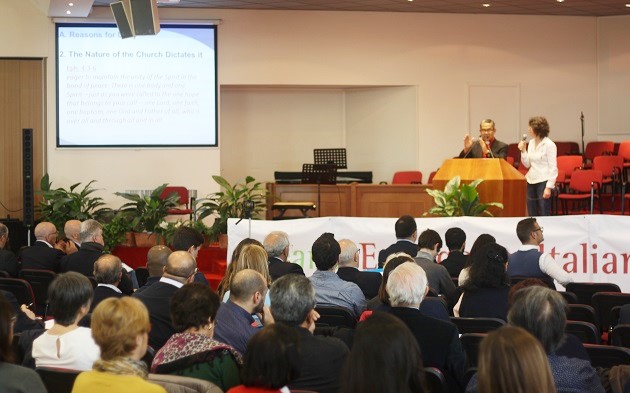 Efraim Tendero, Secretary General of the World Evangelical Alliance, during one of the session in Rome. / J. Forster
Efraim Tendero, Secretary General of the World Evangelical Alliance, during one of the session in Rome. / J. Forster
Bishop Efraim Tendero became the first World Evangelical Alliance Secretary General to visit an Italian Evangelical Alliance assembly. His views and those of Spanish Evangelical Alliance Secretary General Jaume Llenas were heard by about 200 people.
After suffering a flight delay of 24 hours, Bishop Efraim Tendero arrived just in time to the Alfa & Omega church in the outskirts of Rome where the Italian Evangelical Alliance (AEI) was closing the first day of its annual assembly (8-9 April).
The theme chosen by the AEI for the weekend was: “Evangelical faith and Roman Catholicism: Where are we? Where are we going?”
This second report about the 2016 Italian Evangelical Alliance general assembly summarises the opinions of Bishop Efraim Tendero (Secretary General of the World Evangelical Alliance) and Jaume Llenas (Secretary General of the Spanish Evangelical Alliance). Read about the sessions led by Italian evangelical leaders in the first report.
EFRAIM TENDERO: “DISTINCTION MARKS OF EVANGELICALS”
In a session after dinner, Efraim Tendero briefly outlined his convictions. He started giving some details about his first year leading the World Evangelical Alliance (WEA). He expressed his desire to listen and understand the reality of evangelical Christians in different countries and cultural contexts. [Bishop Efraim Tendero commented more on this idea in an exclusive interview he gave to Evangelical Focus, which will be published in the coming days.]
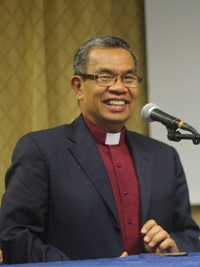 Bishop Tendero explained his view of what evangelicals believe. / J. Forster
Bishop Tendero explained his view of what evangelicals believe. / J. ForsterTendero referred to his visit to Israel (March 2016) and the talks he had with government officials to propel the “full recognition” of evangelicals - churches are not allowed to register their own marriages there, among other limitations. When asked by a Jewish religious leader to stop all forms of mission towards Jews for a period of time, Tendero answered: “If we stop sharing the gospel, we stop being evangelical Christians”.
Sharing the Good News of Jesus Christ should always be the priority for evangelical Christians, Tendero underlined. He then went on to suggest 5 other distinction marks which describe who evangelical Christians are:
- “We believe in the authority of the Bible as the Word of God.
- We believe in God in three persons.
- We believe in the divinity of Jesus Christ.
- We believe in salvation only through faith in Jesus Christ.
- We believe in the centrality of mission in the Church.”
“This five points make us evangelical Christians”, Tendero concluded, and this is why “Roman Catholics cannot be considered as evangelicals.” They have a “tradition which is added to the Bible and they believe in the merits [for salvation] besides of Jesus.”
What about the differences ‘inside’ Evangelicalism? “One of the obstacles to the expansion of the Gospel is the lack of unity among evangelicals”, Tendero said. “We do not have a Pope, we have the priesthood of all believers, under one head which is Christ. The WEA is the visibilisation of the unity of evangelicals.”
Nevertheless, “at times it seems that every evangelical church has its own Pope”, he added with irony.
THE NEED FOR UNITY AMONG EVANGELICALS
On Saturday, the WEA Secretary General opened the sessions again. Following th reflection of the day before, he shared three foundations for the unity among evangelical Christians: “the triune God demonstrated it, the nature of the Church dictates it and the magnitude of the task (the mission) demands it”, he said. “A friend says that if we are not able to work together, we are like two ants fighting each other to see who eats the elephant.”
Tendero called to “concentrate on agreement”, searching the “shared purpose and the common denominators” all evangelical churches have. This implies, as Jesus said, to “die to one self.”
Working together can happen on different levels, be it through simple networking, through collaboration or even organisational union.
There is a “mission unity in the WEA”, based on “the fellowship in the Gospel, the defence and confirmation of the Gospel and the furtherance of the Gospel”. And then, there is a “unity on common concerns”, Tendero continued, such as “poverty alleviation, Human Rights issues, terrorism, nuclear weapons, sustainable development, integrity in political electoral processes, etc.”
The Secretary General closed by saying that “Missional witness (preaching the Gospel) and the Salt and Light Witness (Preserves and transforms society)” need to go hand in hand.
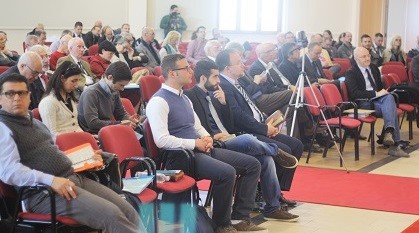 Some of the participants in the AEI Assembly in Rome. / J. Forster
Some of the participants in the AEI Assembly in Rome. / J. Forster
ROUND TABLE: HOW IS SITUATION IN THE 21st CENTURY?
The AEI annual meeting closed with a final round table (read about the other sessions), in which Bishop Tendero and Jaume Llenas (Spanish Evangelical Alliance, AEE) joined AEI’s President Giacomo Ciccone to discuss their points of view on the topic “Evangelicals and Roman Catholicism in the 21st century.”
Giuseppe Rizza had introduced the discussion pointing out two trends: “The fact that the centre of Christianity has shifted from the North to the South” is one. The other: “While secularism says religion is part of the past, it is obvious that we are living in a very religious century.”
LLENAS: “NO COMMON SOURCES OF AUTHORITY” WITH CATHOLICISM
“When we relate to Roman Catholicism we need to think: Why? And, for what?”, AEE Secretary General Jaume Llenas said. “For Catholics, the Church equates to the institution, and therefore, they would say we evangelicals are not Church.” Meanwhile, “we believe there is some Church inside Roman Catholicism, but we do not see the Church as a human institution. This is the first problem we have.”
The second common obstacle, Llenas continued, is that “there are no common sources of authority. This means that when we have dialogue with them, it leads to nowhere most of the time. We mainly are losing time. The ecumenical chat is frustrating”.
Dialogue needs to be seen from a new perspective: “We have to go to a new concept: the dialogue with society. We have to talk to the whole society. We need to penetrate society, and there, in the society, we also will find Catholics.”
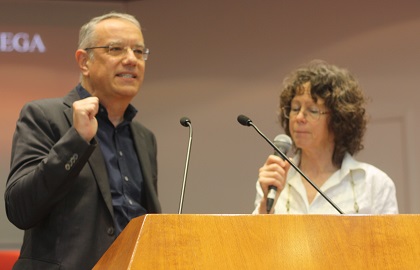 Jaume Llenas, giving the Spanish point of view. / J. Forster
Jaume Llenas, giving the Spanish point of view. / J. Forster“When we talk to Catholics in a religious context, we seem to be on different levels: they are higher. But the conversation in society it is different.” Llenas used the example of a hotel. Roman Catholicism may be staying in the luxurious ‘suite’, while evangelical Christians have a regular room. “But the conversation should not happen in the ‘suite’, but in the ‘bar’ down in the ‘hall’, where we all are equal.”
DIALOGUE WITH SOCIETY, NOT ONLY WITH CATHOLICS
Another obstacle to a real and honest dialogue is that “the Roman Church wants to preserve its position and privileges. But this is changing and almost finished.”
A problem for the future of Catholicism is that its “tradition is not part of the faith, but its centre”, the Spanish representative said. “If you listen carefully, it is ‘tradition + tradition’. Even the Bible is ‘tradition’ for them. The authority of the Roman Church is not the Bible, it’s Magisterium of the Church”.
But the “reality is there are no traditional people left in Europe. We are post-modern, and the Catholic churches have a membership of post-modern people, and this is why the boat is sinking.”
The AEE leader went further to say that this also affects the evangelical churches. “Christendom as a cultural era is also finishing for us. And we are not connecting with society”, he warned.
“When we fear, we usually go back to the ‘good old times’, to a certain ‘golden era.’ But we are not going back enough”, Llenas said, referring to the importance of rediscovering the Reformation and the Early Church. The identity is only to be found in the “centre of our calling, the mission of God.”
Llenas concluded by saying that the Spanish Evangelical Alliance fully agrees with the WEA Singapore 1986 document and the 2007 EEA text, two statements which pointed out the need to be careful in the dialogue with Roman Catholicism.
“We do not agree with doing joint proclamarion with Roman Catholics. This only confuses people. But I see space to do good together, for co-belligerance not only with Catholics, but also with many other groups in society.”
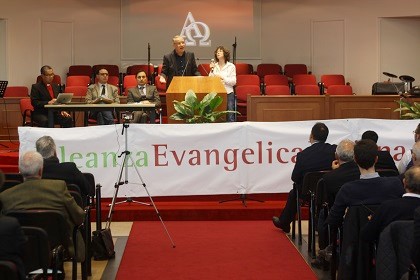 A general view of one of the sessions. / J. Forster
A general view of one of the sessions. / J. Forster
TENDERO: THE PHILIPPINES AS AN EXAMPLE
When Efraim Tendero took the word in the round table, he started by giving an example of the Philippines. “There we are 10% evangelicals, and Catholics are 80%. We have good relationships, but we have no ecumenical relationships.”
“As an evangelical I do not believe in ecumenical relationships”, Tendero emphasised.
To illustrate this, the WEA Secretary General explained how the name of the “WEA Ecumenical Relationships Group” group had been changed to “Inter-faith Relationships Group” (when dialoguing with other religions) and “Intra-faith Relationships Group” (when talking to other Christians faiths.) The aim was to show that “these dialogues are not ecumenical.”
EVANGELICALS CAN BE “OVERWHELMING MINORITY”
“In the 20 years of experience in Philippines I have initiated inter-faith dialogues, with different religions, focusing on social questions in which we have to work together. We are smaller, but when we meet in the ‘hall’, we are all on the same level”, he added.
“We might be a minority with these dialogue with other religions and with other parts of society, but with the guidance of God, we can be an ‘overwhelming minority’”, the WEA Secretary General added.
Evangelical Christians need to have a clear identity in the Gospel. “When we relate to other religions, our position of strength is to know who we are”, Tendero concluded.
CICCONE: IMPORTANCE OF DOCTRINE
Giacomo Ciccone closed the panel by saying that the biblical doctrines which define the evangelical faith are “not just a checklist.” “Our declaration of faith cannot just be a number of empty titles”, the AEI President responded to those who say there are only minor differences with Roman Catholicism.
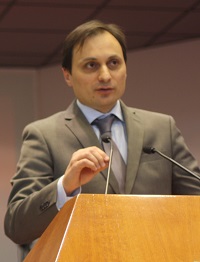 Giacomo Ciccone, during the AEI assembly. / J. Forster
Giacomo Ciccone, during the AEI assembly. / J. Forster“With acronyms and short messages we lose the deep sense of doctrines like the authority of the Bible, and the Christology. We cannot reduce these points, they are connected to each other. Take the 5 Solas for example, we cannot just take one and leave the others out, because they are an organic body.”
“Honesty” is important when approaching the dialogue with Catholicism. It might be difficult to find the heart of what Roman Catholicism teaches when looking at different internal movements, but it is “easier” to just look at the “official documents, the real essence of Catholicism. This is what we need to evaluate before what is said or anything else.”
“As the AEI we said it in the past: we have not agreed with the WEA in severals debates.” But the “Italian Evangelical Alliance is part of the WEA, and very happily. We are honoured to be part of the people of God in 130 countries.”
Adding to the views of the World and Spanish Alliances, Ciccone said: “We see a distinction between spiritual unity, on the one side, and co-belligerence and dialogue, on the other.” And “we are very determined to dialogue, debate and do co-belligerence with Catholics.” An example of this was the active participation of the AEI in a massive pro-family demonstration in 2015, where most of the organisation were Roman Catholics.
“But the spiritual unity needs to be based on biblical categories”, the AEI President concluded.

Las opiniones vertidas por nuestros colaboradores se realizan a nivel personal, pudiendo coincidir o no con la postura de la dirección de Protestante Digital.
Si quieres comentar o